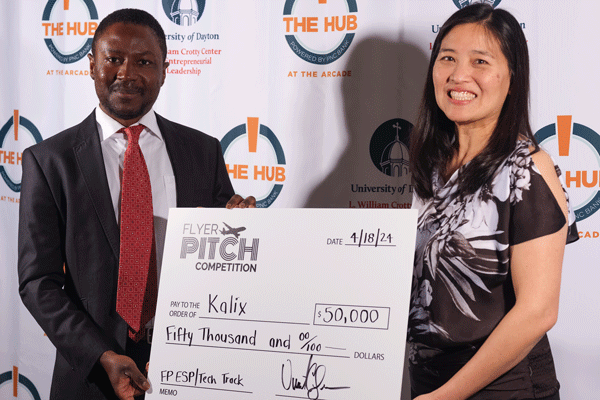Dayton Engineer

Flyer Pitch prizes go to better disease detection, Black health, fatherless girls
The University of Dayton’s Flyer Pitch awarded top prizes from among 100 applicants to a new rapid test to detect disease among farm animals and crops; a social enterprise to promote better health for Black Americans; and a nonprofit dedicated to helping fatherless teen girls.
“These are more than entrepreneurial ventures, they're catalysts for change,” said David Marshall, Crotty Center for Entrepreneurial Leadership director. “This year’s winners add to Flyer Pitch’s 18-year legacy of helping to launch and grow successful businesses and nonprofits that drive a positive impact in our community and beyond.”
Kalix, a technology created at UD, won $25,000 cash and $25,000 of support from the Entrepreneurs' Center. Kalix provides solutions for low-cost, rapid, accurate and on-site detection and management of diseases caused by parasites, bacteria or viruses in animal, poultry, dairy and agricultural farms.
“The way existing testing works, farmers have to send samples to outside labs and the results can take days or even weeks,” said co-founder Vamsy Chodavarapu, electrical and computer engineering professor. “The delay costs valuable time and money as diseases in animals and birds can spread quickly. Kalix technology combines advanced molecular diagnostics systems and reagents and artificial intelligence to enable disease detection and management right at the farms, and one need not be a microbiology expert to use it.” Pictured are Tchamie Kadja, recent electrical and computer engineering graduate student who continues to teach for the School of Engineering and Wenbi Hirakawa, adjunct faculty member.
Black Health Lit, which won $15,000 cash and $1,625 in-kind support in the portion of the competition for businesses, offers community-based and culturally specific health literacy programming.
“The seed for Black Health Lit was planted and grew from my childhood experiences, visiting my mother who is a registered nurse at the public health department,” said founder Rachel Crowder. “At Black Health Lit, our services are centered on culturally tailored health literacy programs, empowering healthcare professionals, and establishing a sustainable social enterprise model. Our initiatives aim to drive meaningful change.”
From Fatherless to Fearless, which won $10,000 cash and $5,500 in-kind support in the portion of the competition for nonprofits, offers services to teen girls who have absent fathers or strained relationships.
“I understand what these young women are going through because I was fatherless as a girl and I have experienced trauma and financial instability,” said founder Candice Crear. “Whether your father is absent, incarcerated, deceased or emotionally distant, we understand and we want to help you on your journey to healing and being whole.”
Flyer Pitch is among the largest new venture competitions at the collegiate level. Now in its 18th year, teams won a total of $118,500 cash and $40,000 of in-kind support.
More information and a full list of winners is available online.
